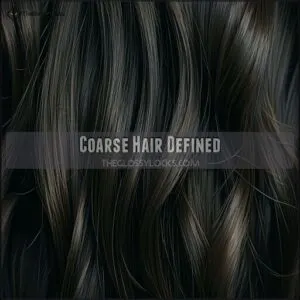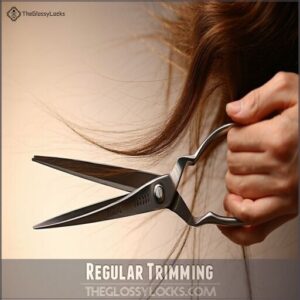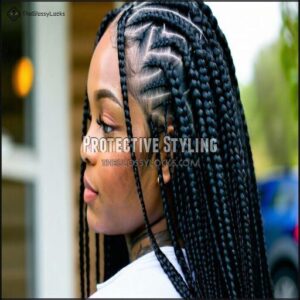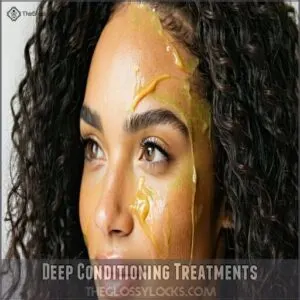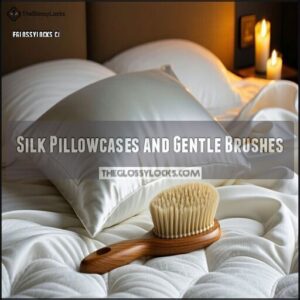This site is supported by our readers. We may earn a commission, at no cost to you, if you purchase through links.
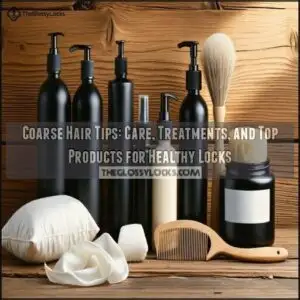 Coarse hair thrives on care that works with its unique texture. Start by moisturizing often—hydration is the key to taming dryness and frizz.
Coarse hair thrives on care that works with its unique texture. Start by moisturizing often—hydration is the key to taming dryness and frizz.
Think rich conditioners, leave-in treatments, and hydrating serums like Paul Mitchell Super Skinny Serum. Protective styles, like loose braids or twists, help reduce damage, while regular trims prevent split ends.
Deep conditioning weekly with a product like Maui Moisture Shea Butter Hair Mask can soften your strands, making them manageable.
Use gentler tools like wide-tooth combs and switch to silk pillowcases—they’re kinder to your hair.
Want to tap into its full potential? The right techniques and products make all the difference.
Table Of Contents
- Key Takeaways
- Coarse Hair Defined
- Causes of Coarse Hair
- Caring for Coarse Hair
- Top 4 Coarse Hair Tips
- Managing Coarse Hair
- Frequently Asked Questions (FAQs)
- How can I make my hair less coarse?
- What is coarse hair a symptom of?
- What are the benefits of coarse hair?
- What causes fine coarse hair?
- What are the best products to use for coarse hair?
- How often should I trim my coarse hair?
- How can I prevent dryness and split ends in coarse hair?
- Are there any natural remedies for coarse hair?
- Should I use heat styling tools on my coarse hair?
- How to detangle coarse hair without breakage?
- Conclusion
Key Takeaways
- Use moisturizing products like deep conditioners, leave-in treatments, and serums to hydrate your hair and tackle dryness.
- Protect your strands with silk pillowcases, wide-tooth combs, and regular trims to reduce damage and split ends.
- Try protective styles like loose braids or twists to minimize tension and maintain hair health.
- Avoid overusing heat tools and harsh chemicals; instead, opt for sulfate-free shampoos and lightweight natural oils like argan or jojoba.
Coarse Hair Defined
Coarse hair refers to individual strands that are thicker and wider in diameter, often feeling sturdy and strong.
Thick, strong, and resilient—coarse hair stands out with its bold texture and natural robustness.
It’s not about roughness or manageability but rather the natural structure and size of each strand.
Thickness and Diameter
Coarse hair stands out with its wide strand width and noticeable diameter variation.
Its strand thickness feels sturdy, often likened to sewing thread.
Unlike hair density, which measures the number of strands on your scalp, strand width defines coarse measurement.
A quick visual assessment can reveal these traits—perfect for fine-tuning coarse hair care or exploring thick hair tips effectively.
You can also try the ponytail circumference test to assess hair density.
Texture and Porosity
Understanding hair texture and porosity reveals why your strands might feel dry or frizzy.
Coarse hair has thick cuticle layers, which impact moisture retention and product penetration. With high porosity, it absorbs moisture quickly but loses it just as fast.
Coarse hair drinks up moisture fast but struggles to keep it, making hydration the key to lasting softness and manageability.
- Low porosity: Less moisture absorption, needs lightweight products.
- High porosity: Dries fast, needs richer treatments.
- Medium porosity: Balanced hydration and elasticity.
Genetics and Ethnicity
Your hair texture often reflects your family roots.
Hair genetics play a big role, and ancestry impact shapes coarse hair across various hair types.
Traits like thickness and strength are often tied to ethnic predisposition.
For example:
| Hair Ethnicities | Common Traits |
|---|---|
| African ancestry | Thick, coily |
| Asian ancestry | Straight, coarse |
| European ancestry | Fine, diverse |
| Mixed heritage | Varies widely |
Trait inheritance showcases hair evolution beautifully, highlighting the role of hair genetics and ethnic predisposition in determining hair texture.
Environmental Factors
When thinking about managing coarse hair, don’t underestimate how environmental factors play a role.
UV exposure can dry out coarse hair, while pollution damage and humidity effects leave it frizzy.
Weather changes, like harsh winters or humid summers, can worsen dry coarse hair.
Prioritize proper seasonal care, like deep conditioning and protective products, to keep coarse hair strong and healthy.
Causes of Coarse Hair
Coarse hair can result from factors like genetics, hormonal changes, or medical conditions that alter your hair’s structure.
External influences, such as heat styling and environmental damage, can also play a role in making strands thicker and less pliable, due to genetics or other factors.
Genetic Predisposition
Blame your ancestors—coarse hair often comes with inherited traits tied to ancestry.
Its strand thickness results from the shape and size of hair follicles, which genetic research links to ethnic prevalence.
Some groups, like people of African and Asian descent, are more likely to share these features.
Your unique hair texture is a direct reflection of your lineage.
- Key influences: Family genetics, ancestry, and ethnicity.
- Follicle factors: Shape, size, and strand diameter.
- Ethnic prevalence: Strongest in African and Asian lineages.
Hormonal Imbalances
Hormones play a huge part in hair health.
Imbalances, like those from menopause effects, pregnancy changes, thyroid impact, or contraceptive influence, can suddenly leave you dealing with coarse hair or unwanted hair growth.
This hormone-hair link often leads to dryness, hair breakage, and texture shifts.
Balancing hormones through diet, medication, or lifestyle adjustments can restore your hair’s liveliness.
Medical Conditions
Sometimes, coarse hair signals deeper health concerns.
Medical conditions disrupt scalp health, altering hair’s texture and growth.
Pay attention to:
- Thyroid impact: Hypothyroidism often leads to brittle, coarse strands.
- Steroid effects: Usage or conditions causing overexposure can change hair health.
- Nutrient deficiencies: Lacking iron or calcium weakens hair, causing breakage and dryness.
Addressing these strengthens hair care and overall wellness.
External Factors
Sun exposure, heat styling, and chemical treatments can make already dry coarse hair frizzier and harder to manage.
Don’t overlook environmental damage—harsh weather and pollution add to product buildup, weakening your strands over time.
Focus on coarse hair care with moisturizing products to combat dryness.
Protect your hair to keep it strong and manageable, even in tough conditions.
| External Factor | Effect on Coarse Hair | Solution |
|---|---|---|
| Sun Exposure | Dries hair out | Use UV-protectant sprays |
| Heat Styling | Causes brittleness | Limit use, apply heat protectants |
| Chemical Treatments | Weakens strands | Switch to gentler, sulfate-free products |
Caring for Coarse Hair
To care for coarse hair effectively, focus on keeping it hydrated with moisturizing shampoos, conditioners, and weekly treatments.
Regular trims, protective styles, and minimal heat use will help maintain health and prevent damage, ensuring the hair remains hydrated.
Moisturizing and Hydrating
Dealing with dry coarse hair? Hydrating coarse hair starts with proper moisturizing techniques.
Use hydration methods like weekly deep conditioning treatments featuring humectants such as glycerin or honey. Look for product ingredients like shea butter and coconut oil to lock in moisture.
Proper coarse hair hydration is key to manageability.
Oil layering boosts scalp health while sealing hydration, keeping strands soft and manageable all day.
Regular Trimming
Keeping coarse hair healthy means sticking to a regular trimming schedule.
Trimming every 8-10 weeks helps with split end prevention and shape maintenance, letting your hair look its best.
Professional cuts guarantee precision, but DIY trims work with care.
This important step in your hair care routine also supports growth stimulation by preventing damage from spreading, boosting overall health.
Protective Styling
Protective styles like box braids and two-strand twists are lifesavers for coarse hair care. They minimize tension concerns, product buildup, and frizz while promoting scalp health.
These coarse hair styles guarantee style longevity and reduce daily maintenance. Keep your coarse hair routine balanced by moisturizing regularly and using gentle accessories.
Hairstyle variety also helps protect against damage without sacrificing creativity. For additional protection and moisture retention, consider flat twists for natural hair.
Top 4 Coarse Hair Tips
In the case of managing coarse hair, using the right products can make all the difference in keeping it healthy and hydrated.
From serums to masks, these top picks will help you lock in moisture, reduce frizz, and enhance manageability.
1. Paul Mitchell Super Skinny Serum
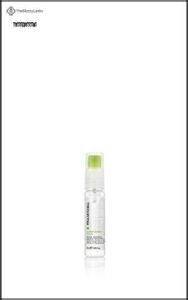
Packed with benefits, Paul Mitchell Super Skinny Serum works wonders for coarse hair.
This lightweight serum tames frizz, smooths strands, and cuts down blow-dry time by up to one-third. Its heat protection up to 450°F guarantees styling is safe, while silicones penetrate the hair without leaving it greasy.
Apply a pea-sized amount to damp hair, focusing on mid-lengths and ends for silky, manageable locks. Its long-lasting formula and vibrant scent make it a must-have for taming even the most unruly tresses, with heat protection and a lightweight feel.
Best For: Individuals with coarse, frizz-prone, or thick hair seeking smoother, shinier, and more manageable locks.
- Reduces blow-dry time by up to one-third.
- Offers heat protection up to 450°F.
- Lightweight formula that tames frizz without greasiness.
- Pump mechanism may be unreliable.
- Scent may be too strong for some users.
- May not work as effectively for all hair types.
2. Bali Secret Hair Repair Serum
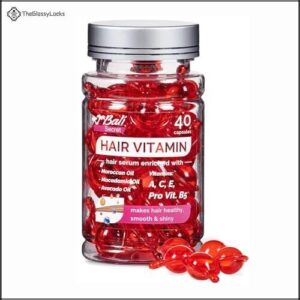
Bali Secret Hair Repair Serum is a must-try for coarse hair, delivering silky softness and radiant shine after just one use.
Packed with avocado, macadamia, and argan oils, plus essential vitamins, it nourishes and repairs hair without weighing it down. This lightweight serum tames frizz, boosts flexibility, and enhances manageability, all while leaving a subtle fragrance.
For best results, consider scalp stimulation techniques to encourage healthy hair growth.
Whether your hair is wet or dry, it’s easy to apply—rub it in, let it work, and enjoy healthier, hydrated strands every day!
Best For: Individuals with frizzy, damaged, or coarse hair seeking a lightweight, nourishing serum for daily use.
- Capsules can be difficult to open, particularly for older users.
- Higher price point may not fit all budgets.
- Limited to 40 capsules per bottle, which may not last long for frequent users.
- Lightweight formula, leaving hair soft and manageable.
- Contains nourishing oils and vitamins for repair and hydration.
- Subtle fragrance praised for its pleasant aroma.
3. TWIST Gentle Oil Infused Shampoo
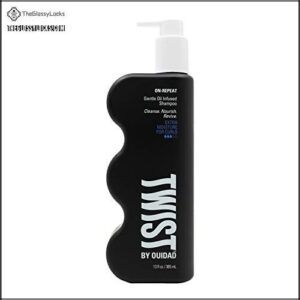
TWIST Gentle Oil Infused Shampoo is a game-changer for coarse hair.
Its nourishing formula, packed with coconut, ginger, and bergamot oils, cleanses without stripping natural oils.
Perfect for curls, it replenishes moisture, softens strands, and prevents frizz, leaving your hair manageable and shiny.
Safe for color-treated hair, it’s gentle enough for daily use.
While some users find the fragrance strong, others love its hydrating qualities. If you’re battling dryness or unruly strands, this shampoo might become your new go-to for healthy, defined locks.
Key features of this shampoo include its ability to replenish moisture and soften strands, making it an excellent choice for those with coarse hair.
Best For: Individuals with curly, wavy, or coarse hair seeking a moisturizing shampoo that enhances shine and softens strands.
- Cleanses without stripping natural oils.
- Replenishes moisture and prevents frizz.
- Suitable for daily use and color-treated hair.
- Fragrance may be too strong for sensitive users.
- May require a larger amount per use.
- Not ideal for extended time between washes.
4. Maui Moisture Shea Butter Hair Mask
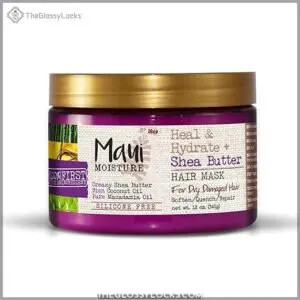
The Maui Moisture Shea Butter Hair Mask is your secret weapon for taming coarse locks.
Infused with creamy shea butter, coconut oil, and macadamia oil, it deeply hydrates, softens, and restores moisture.
This vegan-friendly mask, free from silicones and parabens, doubles as a leave-in conditioner for daily use.
Apply generously after shampooing, leave for 5-10 minutes (or longer for deep conditioning), and watch frizz vanish while manageability improves.
Its tropical scent adds a luxurious touch to your routine, making it a great way to pamper yourself.
The Maui Moisture Shea Butter Hair Mask is a vegan-friendly solution for hair care.
Best For: Those with wavy to tight curls and medium to dry hair seeking deep hydration and frizz control.
- Deeply hydrates and restores moisture for coarse hair.
- Free from silicones, parabens, and sulfates, making it gentle on hair.
- Doubles as a leave-in conditioner for added versatility.
- May feel heavy on very fine hair if overused.
- Strong scent that may not appeal to everyone.
- Requires more product for dry hair application.
Managing Coarse Hair
Managing coarse hair requires consistent care to keep it hydrated, soft, and manageable.
Simple steps like using deep conditioning treatments, co-washing products, and silk pillowcases can help protect your strands and reduce dryness.
Deep Conditioning Treatments
For the best coarse hair treatment, deep conditioning works wonders.
Boost hydration and manageability with:
- DIY Masks: Blend avocado, honey, and coconut oil for hydrating coarse hair.
- Heat Application: Use a shower cap and warm towel for better absorption.
- Protein Balance: Choose masks with keratin or silk proteins to strengthen strands, ensuring your coarse hair stays soft and resilient.
Co-washing and Leave-in Conditioners
Co-washing, a gentle alternative to shampoo, cleanses coarse hair while giving a hydration boost and fighting product buildup.
Pair it with a leave-in conditioner for frizz control, tangle-free styling, and scalp health. These products lock in moisture and enhance detangling benefits.
A great way to keep 4C hair healthy is conditioner washing, which preserves natural oils.
| Product | Key Ingredient | Benefits |
|---|---|---|
| TWIST Shampoo | Coconut Oil | Hydration Boost |
| Paul Mitchell Serum | Dimethicone | Frizz Control |
| Bali Hair Repair | Argan Oil | Scalp Health |
| Maui Hair Mask | Shea Butter | Lock in Moisture |
| Shea Moisture Cream | Jojoba Oil | Detangling Benefits |
For more information on co-washing 4C hair, visit conditioner washing.
Silk Pillowcases and Gentle Brushes
Swap your pillowcase for silk, and your hair will thank you. Silk benefits include better friction reduction, which preserves coarse hair texture and prevents breakage. Pair this with gentle brushing to keep strands strong.
Many people find that silk pillowcases help with hair health.
Here’s how to promote hair health:
- Use silk pillowcases for smoother sleep.
- Pick boar bristle brushes.
- Detangle with care.
- Avoid harsh strokes.
- Comb ends first.
Healthy Diet and Lifestyle Habits
A nutritious diet and hydration are key to coarse hair care. Load up on protein, vitamins, and omega-3s for better hair nutrition.
Regular exercise boosts circulation, enhancing scalp health. Reduce stress—it impacts hair!
Consider supplements like biotin for extra hair vitamins. Small lifestyle tweaks go a long way in supporting luscious, healthy locks.
| Key Practice | Benefit |
|---|---|
| Hydration | Prevents dryness and breakage |
| Nutritious Diet | Strengthens strands |
| Stress Reduction | Improves scalp health |
| Exercise Benefits | Boosts blood flow to follicles |
Frequently Asked Questions (FAQs)
How can I make my hair less coarse?
Moisturize regularly with deep conditioners and oils like argan or jojoba.
Avoid alcohol-based products, and use sulfate-free shampoos.
Protect your hair from heat, trim split ends every 8-10 weeks, and sleep on silk pillowcases to prevent further damage.
What is coarse hair a symptom of?
Coarse hair can signal genetics, aging, or hormonal shifts like pregnancy or menopause.
It might also hint at health issues like hypothyroidism, nutrient deficiencies, or environmental stress from sun and chemicals affecting hair texture, which can be related to genetics.
What are the benefits of coarse hair?
Coarse hair stands out for its strength and resilience.
It’s less prone to breakage, holds styles longer, and offers incredible volume.
You’ll find it provides a sturdy base for creative hairdos and bold looks.
What causes fine coarse hair?
Don’t worry, you’re not alone in wondering.
Fine coarse hair often results from genetics, hormonal changes, aging, or environmental damage.
Over-styling, heat tools, or nutrient deficiencies can also trigger this unique combination.
What are the best products to use for coarse hair?
Go for sulfate-free shampoos.
Deep conditioners with shea butter or glycerin help to nourish and moisturize your hair.
Lightweight oils like argan or jojoba are also beneficial.
Silk pillowcases help reduce tangles.
Alcohol-free serums lock in moisture and tame frizz perfectly.
How often should I trim my coarse hair?
Trim your hair every 8-10 weeks to keep it healthy and split-end free.
Regular trims prevent damage from creeping up the strands, making styling easier and helping your coarse hair look its absolute best.
How can I prevent dryness and split ends in coarse hair?
A stitch in time saves nine—hydration is key.
Use sulfate-free shampoos sparingly, deep condition weekly, and seal ends with natural oils.
Sleep on silk, and trim every 8-10 weeks to escape dryness and splits.
Are there any natural remedies for coarse hair?
Try natural remedies like coconut or argan oil for deep hydration.
Honey masks lock in moisture, and aloe vera adds softness.
These ingredients nourish strands, reduce frizz, and add shine without harsh chemicals.
Should I use heat styling tools on my coarse hair?
In the case of heat styling coarse hair, don’t play with fire.
Use tools sparingly, always apply a heat protectant, and keep temperature low.
Overusing heat can cause dryness, breakage, and lasting damage.
How to detangle coarse hair without breakage?
Start with a generous amount of conditioner or detangling spray.
Work from the ends upward, gently untangling knots to avoid snapping strands or causing breakage.
Use your fingers or a wide-tooth comb.
Conclusion
While coarse hair may seem challenging, it’s also incredibly resilient and full of personality.
By combining proper care techniques with hydrating products, like leave-in treatments and serums, you can maintain its health and enhance its natural beauty.
Don’t shy away from protective styles, regular trims, and weekly deep conditioning sessions. Small steps, like switching to silk pillowcases or using a wide-tooth comb, make a big difference.
Embrace these coarse hair tips to reveal your hair’s full potential!

